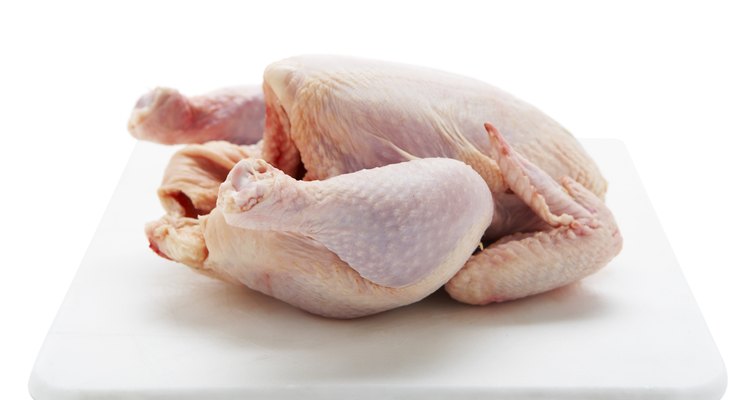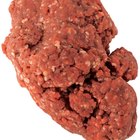More Articles

Once you get a whiff of a bad piece of chicken, the smell is forever recognizable. Not only is smelly poultry unappetizing, it may also put your health at risk if ingested. If you question the freshness of putrid smelling chicken -- better safe than sorry. The risk of foodborne illness is simply not worth the risk. Throw the smelly piece of poultry away and don’t even give a second thought to cooking and eating it.
Ooh That Smell
Rotten eggs and chicken both give off a sulfur smell when they go bad. This smell is associated with spoilage caused by strains of dangerous bacteria. Low-temperature storage and poor packaging practices are usually responsible for the overgrowth of these dangerous bacterium that may lead to foodborne illness. While the smell of sulfur is usually a dead giveaway that the chicken is bad, a few other clues may also be present.
Slimy Color Changes
Along with the bad sulfur smell, you may also notice some color changes in spoiled chicken. Darkening or fading of the meat often accompanies the unappetizing odor of bad chicken. Chicken that smells bad may also feel slimy to the touch. The slimy feel results when bacteria begins to accumulate on the outer surface of the chicken, and may also indicate tissue and protein breakdown in the meat.
Bacteria
The bacteria present on bad smelling chicken that causes all of these indicators of spoilage may also cause serious illness if ingested. Common symptoms of foodborne illness often mimic flu systems. These symptoms include nausea, vomiting, diarrhea and in some instances, fever. While the healthiest of people may ingest these bacteria without incurring any symptoms, young children, the elderly, pregnant women and those with compromised immune systems tend to be the most symptomatic.
Store it Right
Chicken keeps up to two days in the refrigerator, stored in tightly-sealed, leak-proof containers to prevent juices from contaminating other foods or wrapped tightly in plastic wrap, heavy-duty foil or sealed plastic storage bags. In the freezer, chicken remains safe to eat indefinitely, with pieces experiencing changes to taste and texture after nine months and whole chickens experiencing the same quality loss after one year in the freezer. Prevent freezer burn by tightly wrapping the chicken in freezer wrap, freezer storage bags, heavy-duty foil or airtight freezer storage containers.
Related Articles

Can I Cook a Chicken Five Days After ...

Is it Safe to Cook Chicken 2 Days After ...

Can I Cook Chicken That's Been Thawed ...

Can You Boil the Bacteria Out of ...

Can I Cook Chicken Two Weeks After the ...

What Can I Substitute for Poppy Seeds ...

Can I Cook a Whole Chicken Without ...

How Long Can I Keep Frozen Whole ...

Does Chicken Go Bad if You Marinate It ...

How to Marinate Roast Chicken

How to Get a Crispy Crust on Roasted ...

What Does Spoiled Meat Smell Like When ...

How to Cook Mojo Chicken

How to Cook Chicken Schnitzel

How Long Does It Take for Pork to Spoil ...

Can I Start Marinating While My Chicken ...

How to Cook Chicken Thighs

How to Defrost a Chicken in a ...

Dangers of Spoiled Ground Beef

How to Re-Crisp a Cold Roast Chicken
References
- Google Books: Handbook of Meat, Poultry and Seafood Quality
- U.S. Department of Agriculture: The Color of Meat and Poultry
- Weber State University: Microorganisms and Food Spoilage
- U.S. Department of Agriculture: Foodborne Illness: What Consumers Need to Know
- Foodsafety.org: Storage Times for the Refrigerator and Freezer
- U.S. Department of Agriculture: Chicken From Farm to Table
Writer Bio
Jonae Fredericks started writing in 2007. She also has a background as a licensed cosmetologist and certified skin-care specialist. Jonae Fredericks is a certified paraeducator, presently working in the public education system.
Photo Credits
Thomas Northcut/Photodisc/Getty Images